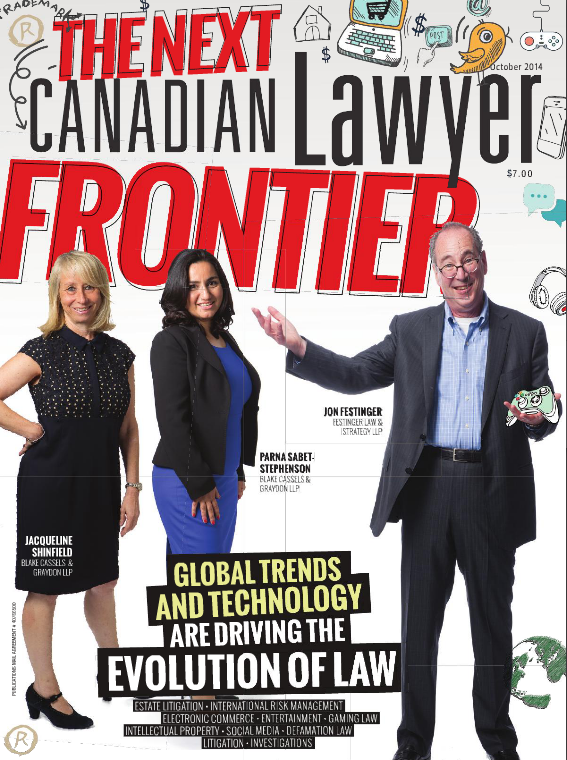
You may notice a familiar face on the cover of this months Canadian lawyer magazine. This essentially came as a surprise as I gave an interview many months ago and had no idea whatsoever that I might end up on the cover of a magazine. It is particularly nice that video game law is identified as being among “The Next Frontier” trends driving the evolution of law. Hyperbole aside and for whatever it’s worth here are the excerpts from the story that you may find relevant:
“Originally a freedom of expression lawyer who started out acting for newsrooms, Jon Festinger of Festinger Law & Strategy LLP teaches video game law at the Faculty of Law at the University of British Columbia. He says there is a component of hardcore gamers in his classes and many are entrepreneurial by nature, creating a new breed of lawyer who wants to leverage their love of gaming into business. “In entertainment law courses these days, largely because of digital media, you will find students who have actually been part of a media company or write blogs or have written a pilot for television because the barriers to entry have gone down in the last 10 to 15 years,” he says. “Video games were the basis for all of these things we think of as giant changes in the world today — social media, 3D, smartphones — all of these things had their first betas in video games because there was money in video games,” he says.
Festinger says the lawyers who know video game law best right now are almost exclusively in-house. “You have to have such an intimate understanding of what the clients want and paying an outside law firm to come up to speed on the particularly specialized issues of gaming law is not cost effective,” he says. “There are some outside counsel who do this but it’s not a file you just land on some lawyer’s desk. It matters whether they play games nor not — it matters that they grasp the issues.”
What doesn’t matter, however, is how small a video game company is because once launched it becomes part of a worldwide business. “That’s the huge paradigm shift in this business,” says Festinger. Finnish video game maker Rovio Entertainment Ltd. and its hit franchise Angry Birds is a perfect example. “Suddenly as soon as you launch that game in the app store you are a worldwide business,” he says.
When it comes to intellectual property in the gaming world, things get really interesting for lawyers. “We’ve sort of moved into a contract world that deals with intellectual property rights but in the world of contract law. We’ve converted it,” says Festinger. “It’s created a ton of work for lawyers. There’s huge criticism around 40-page terms-of-use documents and so now companies like Microsoft are trying to simplify it, which is not bad for lawyers because guess who is doing it? It’s still us.”
The other part of the boom are the deals going down — digital media generally remains a healthy part of the economy.”
jon
 Communications Law
Communications Law